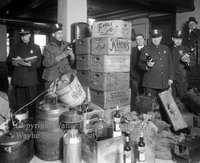
The Volokh Conspiracy blog brings to our attention an interesting New York Times article about drug-free school zones. You know, the area within a certain proximity of a school, where the penalties for drug possession and selling are dramatically increased.
In New York, as in many cities, anything within 1,000 feet of a school is considered part of the "no-go" zone. But what, exactly, does 1,000 feet mean?
NYPD alleges that James Robbins was within the drug-free school zone when he sold drugs to an undercover officer in March of 2002.
Law enforcement officials calculated the straight-line distance using the Pythagorean theorem (a2 + b2 = c2) measuring the distance up Eighth Avenue (764 feet) as one side of a right triangle, and the distance to the church along 43rd Street (490 feet) as another, to find that the length of the hypotenuse was - 907.63 feet.But Robbins's lawyers see it differently.
On foot, Mr. Robbins's lawyers argued, the school is more than 1,000 feet away from the site of the arrest, because the shortest route is blocked by buildings. But as the crow flies, the authorities said, it is less than 1,000 feet away.Unfortunately for Robbins, the New York State Court of Appeals sided with the cops, 7-0. He's now serving a 6-to-12 year sentence.
[snip]
Lawyers for Mr. Robbins argued that the distance should be measured as a person would walk it because "crows do not sell drugs."
Regardless of how the boundaries of drug-free school zones are determined, their efficacy at curtailing drug use and dealing is seriously questionable. According to one study of the school zone law in Massachusetts, the "statute fails to push drug dealing away from schools."
Another problem with the zones, according to Washington Monthly, is that they can virtually encompass entire cities.
A Congressional Research Service study of such areas in the District of Columbia, requested by Massachusetts Sen. Edward Kennedy in 1995, estimated that at least 60 percent of the city fell into a drug-free zone. In New Haven, Conn., the only extensive space that's not part of one is the Yale golf course. In urban areas, drug-free zones often take up more space than they leave.It seems like drug-free school zone statutes are little more than tools of the prison industrial complex. All they do is pack prisons with smalltime drug offenders and boost corrections budgets, while doing nothing to actually keep young people safe from the dangers of drug abuse.
